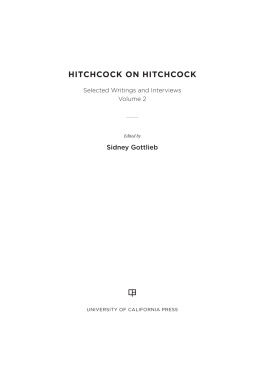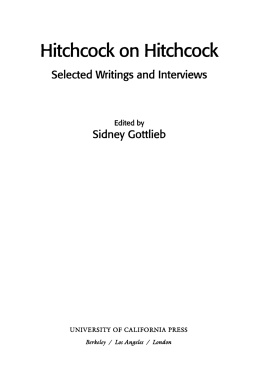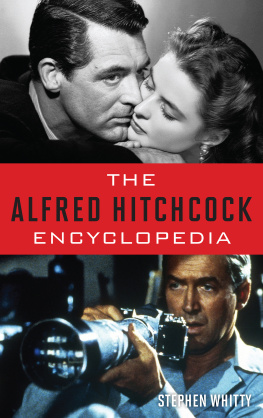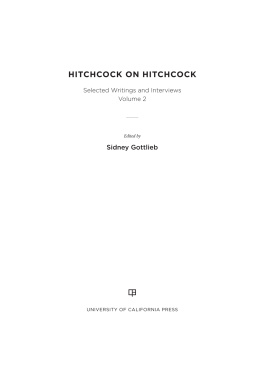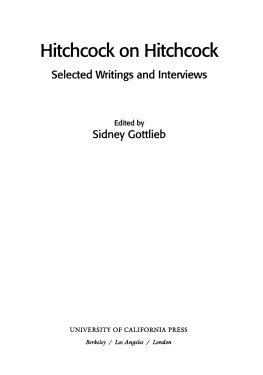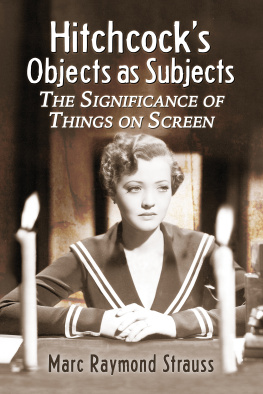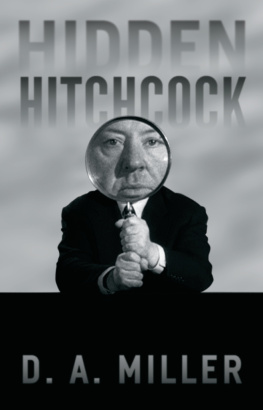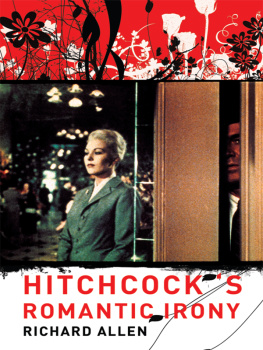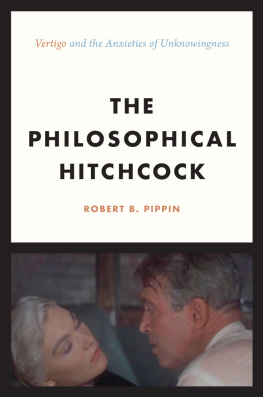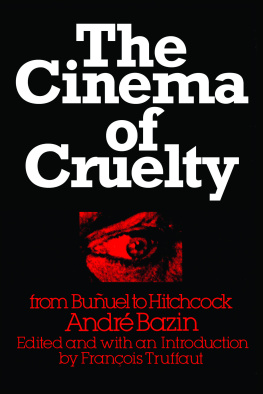R. Allen Leider
ACKNOWLEDGMENTS
I am deeply grateful to Patricia Hitchcock OConnell and Leland Faust, representing the Hitchcock Estate, for their gracious support of this project and their permission to reprint the material herein. I also want to thank Daniel Halpern, Makoto Imai, R. Allen Leider, and F. Anthony Macklin for facilitating further permission to reprint the material herein that they had a hand in. At the University of California Press, Mary Francis was to me what she has been to scores of others, a tireless collaborator, and I have been sustained by her encouragement and efficiency and taken full advantage of her patience. And this second volume of Hitchcock on Hitchcock also bears the imprint of my University of California Press editor for the first volume, Ed Dimendberg, whose good advice then continues to be good advice now.
This book would not have been possible without the generous support and tangible assistance of numerous people who sent me copies of articles that they had discovered or that I was looking for but could not find. Charles Barr and Christopher K. Philippo in particular were constant sources of material as well as information, advice, and encouragement. I also got valuable items and help from Wayne Beach, David Bordwell, Stephane Duckett, David Henry, Alain Kerzoncuf, Nathalie Morris, Patrick McGilligan, Michael Walker, James M. Vest, and Nancy Vest. In addition, James Vest translated two interviews specifically for this volume and made important suggestions and corrections that I integrated into my commentary on these interviews. My work on the Hitchcock-Truffaut material benefited greatly from numerous exchanges with Janet Bergstrom, as well as her own very important essay on that subject. Renata Jackson looked over my introductions, and Robin Whitaker read the entire manuscript and both helped remove innumerable errors and infelicities and offered valuable advice and support.
Much of my research was conducted at the New York Public Library, the Film Study Center at the Museum of Modern art, the British Film Institute, and the Margaret Herrick Library at the Academy of Motion Picture Arts and Sciences. I am grateful to the librarians and research associates at those institutions for their help. And Christopher Philippo has been a particularly good guide for me in navigating the new online research environment that we truly cant live without. I wouldnt have been able to find the time to work on such a long-term project without the long-term help of Andrew Miller, Jim Castonguay, and Debbie Danowski, my colleagues at Sacred Heart University, who in their terms as our department chairperson arranged my teaching schedules and departmental responsibilities in ways that allowed me to do other things as well and coordinated much needed and much appreciated sabbatical leaves, without which two decades of work on this project would have stretched far into a third.
I have always relied on the kindness of friends, and there is little that I do related to Hitchcock that isnt somehow grounded in my admiration for and friendship with Richard Allen, Charles Barr, Thomas Leitch, and David Sterritt, all of which goes far beyond this thing of ours, Hitchcock studies. Closer to home, literally, I am fortunate beyond words to have Chris Sharrett and Rick Grigg as intellectual models, good buddies, and formidable allies in our shared pursuit of the sublime and the ridiculous, Hitchcockian and otherwise.
INTRODUCTION
Some years ago when I proposed publishing a volume of selected writings by and interviews with Alfred Hitchcock, I admit that I felt the need to be somewhat defensive. Several key challenges needed to be addressed: about whether Hitchcock should be taken seriously not only as a filmmaker (Robin Woods famous question had been answered affirmatively, in ways persuasive to most people, by that time) but also as a commenter on films and filmmaking; about whether there was much of interest and substance beyond what was already easily available (especially in what was sometimes considered Truffauts definitive book); and about whether any claim that Hitchcocks pronouncements on film merited extensive consideration was fatally undermined by the fact that they were often presented as glib publicity efforts, were sometimes not easily identifiable as written by Hitchcock himself, and were frequently repetitious, familiar, and prepackaged.
While I was prepared to champion Hitchcock, in fact he didnt and doesnt really need my help, other than as a facilitator in making his often evanescent and inaccessible but frequently thoughtful, revealing, and extremely valuable comments more easily available. The material ultimately published in Hitchcock on Hitchcock: Selected Writings and Interviews, volume 1 (1995), speaks for itself and defends itself quite capably from the above challenges. And as it turns out, so does the material I have gathered for this second volume of Hitchcock on Hitchcock. I think that a strong case could be made for a comprehensive edition (in print or digital format) of all of Hitchcocks writings and interviews, however repetitive and uneven in quality and usefulness such a collection might be: old-school scholarship presents a legitimate model (not just a fetish object) of carefully prepared editions of even the marginalia of significant authors (five thick volumes for Coleridge, for example), and T. S. Eliots quip about the value of even Shakespeares (as yet unearthed) laundry lists applies just as well to our cinematic Shakespeare. But the material available for a second volume of Hitchcock on Hitchcock is far more than the result of a gleaning or a second pressing. New articles by Hitchcock displaying his lifelong reflections on his art and career continue to be discovered, and we have reached a point where these pieces added to ones regrettably left out of the first volume for reasons of space, not quality and level of interest, make up a substantive new collection.

